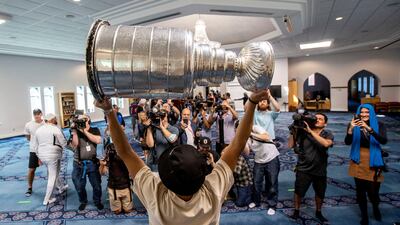A little more than a year ago, the Muslim community of London, Ontario, gathered outside the London Muslim Mosque to mourn the killing of four of their community members, struck down by a pick-up truck while on an evening walk.
On Saturday, they gathered again, this time for a much happier reason, to welcome ice hockey’s Stanley Cup, given to the National Hockey League’s champion team each year.
Nazem Kadri, who was born and raised in London, Ontario, became the first Muslim to hoist the cup, when his Colorado Avalanche defeated the Tampa Bay Lightning four games to two in the Stanley Cup finals in June.
It is tradition for every member of the winning team to spend a day with Lord Stanley’s cup.
There have been joy rides, boat rides, and trips to small towns across Canada, but Kadri is believed to be the first player to take the cup, which is graced with the names of all the teams and players to have won it, to a mosque.
“I couldn't help but reflect on how the last time I was on the footsteps of the mosque with speeches was at the vigil [for the Afzaal family] and what a contrast between the two events and how important this event was to the community, which has been through so much,” said Nawaz Tahir, a community leader, who took his two young children to the mosque to see the Stanley Cup.
For Kadri, 31, it was the culmination of years of hard work and dedication. The forward, who was drafted by the Toronto Maple Leafs seventh overall in the 2009 entry draft, played the first nine years of his career in Toronto before being traded to the Avalanche.
The skilled forward, whose family originally comes from Lebanon, faced racist and Islamaphobic taunts on social media throughout this year’s play-off run.
Those online attacks were condemned by the Council on American-Islamic Relations.
“The appalling racist and Islamophobic rhetorical attacks to which Mr Kadri was subjected demonstrate the seriousness of the threat posed by anti-Muslim bigotry and racism,” the council said.
The online threats were not the only challenge Kadri faced in the playoffs. He was checked from behind and broke his thumb in a series against the Edmonton Oilers, which forced him to miss four games.
The centre was able to return to score an overtime winning goal in Game 4 of the finals that helped his team to the elusive cup.
It capped a career year for Kadri, who registered 87 points in 71 regular season games this year. He added another 15 points in the playoffs.
For Kadri, Saturday was the culmination of a childhood dream, one shared by millions of Canadians across the country.
Hundreds lined up outside the mosque to cheer their hometown hero on and welcome a very special guest.
“I didn’t expect this kind of turnout. I’m very grateful for all the supporters,” he said.
“For all these people, I know they’re on my side, (it) just shows they came over here for me — just very grateful for them.”
Kadri is one of just two muslim players in the NHL, and has become a role model for young Muslim hockey players across Canada and the US.
“That’s the goal, to inspire and motivate the youth. This young generation is looking for role models so I do the best I can and I’m just happy I get to share it with everybody,” he said.
Mr Tahir agreed that it was important for the community’s young people to see Kadri’s success up close.
"For Muslim kids to see a Muslim role model win the Stanley Cup and for it to be literally right in front of our eyes that's special for our kids and I think for the sport,” Mr Tahir told The National.
As for why Kadri took the cup to his childhood mosque, the answer was simple.
“It’s part of my roots, it’s part of who I am," he said.
The Associated Press contributed to this report

















